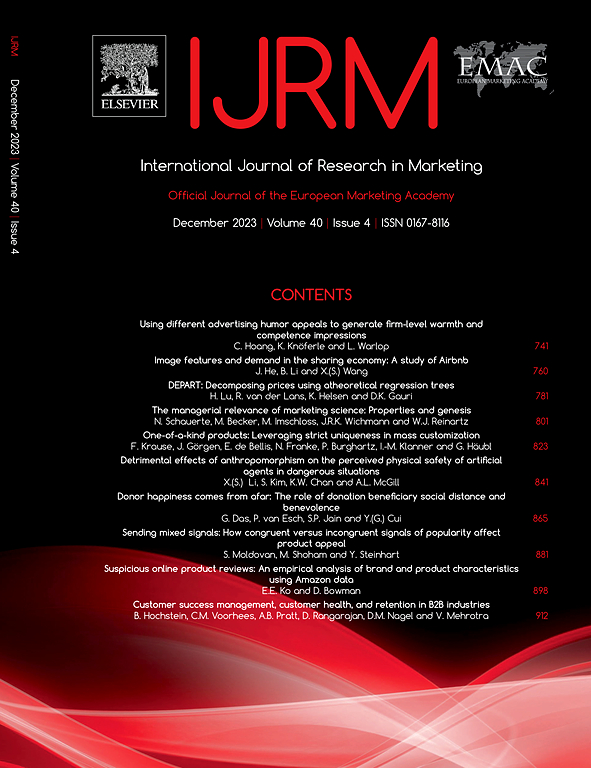越大越好吗?数字化转型如何影响市场份额与盈利能力之间的关系
IF 7.5
2区 管理学
Q1 BUSINESS
International Journal of Research in Marketing
Pub Date : 2024-12-01
DOI:10.1016/j.ijresmar.2024.01.004
引用次数: 0
摘要
大量研究都探讨了市场份额对盈利能力的影响,并普遍发现这两个指标之间存在显著的正相关关系。然而,本文论证了企业的数字化转型已大大改变了这种关系及其内在机制。作者首先从理论上阐述了数字化转型对传统市场份额-盈利能力框架的不同影响。随后,他们以 824 家美国公司 25 年间的 6389 个观察样本为基础,通过使用自行开发和验证的词典对公司财务报表进行文本挖掘,估算了公司盈利能力模型。作者发现,公司的数字化转型程度与市场份额对盈利能力的影响之间存在明显的负交互作用。然而,他们还表明,这一影响受到以下因素的调节:i) 公司的数字化转型重点(即内部流程与外部流程的数字化转型;通过平台化实现的数字化转型);ii) 公司的总体战略重点(相对于价值创造的价值占有);iii) 公司的总体市场环境(B2C 与 B2B)。研究结果表明,数字公司的管理者和投资者在依赖市场份额作为业绩衡量标准时应谨慎行事。本文章由计算机程序翻译,如有差异,请以英文原文为准。
Does bigger still mean better? How digital transformation affects the market share–profitability relationship
Extensive research has examined the effect of market share on profitability and, in general, has found a significantly positive relationship between the two metrics. However, this article demonstrates that the digital transformation of companies has substantially altered this relationship and its underlying mechanisms. The authors first theoretically develop the different influences of digital transformation on the traditional market share–profitability framework. Subsequently, they estimate a firm–profitability model based on a sample of 6,389 observations from 824 U.S. firms over 25 years that accounts for companies’ degree of digital transformation by text mining their financial statements using a self-developed and validated dictionary. The authors find a significantly negative interaction between the degree of digital transformation of a company and the impact of market share on profitability. However, they also show that this effect is moderated by i) a firm’s digital transformation emphasis (i.e., digital transformation of internal vs. external processes; digital transformation through platformization), ii) a firm’s general strategic emphasis (value appropriation relative to value creation), and iii) a firm’s general market environment (B2C versus B2B). The findings suggest that managers and investors of digital companies should exercise caution when relying on market share as a metric for performance.
求助全文
通过发布文献求助,成功后即可免费获取论文全文。
去求助
来源期刊
CiteScore
11.80
自引率
4.30%
发文量
77
审稿时长
66 days
期刊介绍:
The International Journal of Research in Marketing is an international, double-blind peer-reviewed journal for marketing academics and practitioners. Building on a great tradition of global marketing scholarship, IJRM aims to contribute substantially to the field of marketing research by providing a high-quality medium for the dissemination of new marketing knowledge and methods. Among IJRM targeted audience are marketing scholars, practitioners (e.g., marketing research and consulting professionals) and other interested groups and individuals.

 求助内容:
求助内容: 应助结果提醒方式:
应助结果提醒方式:


